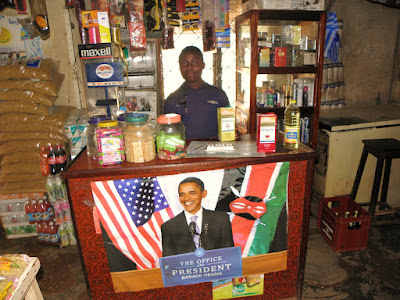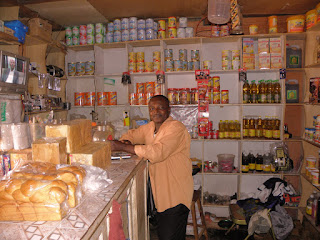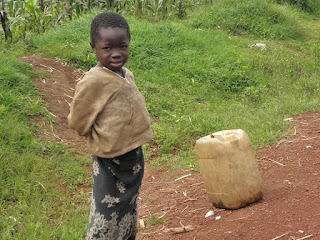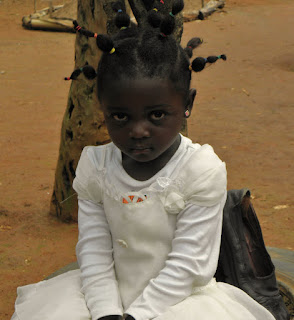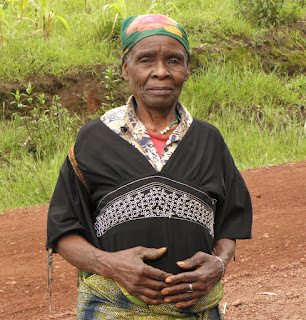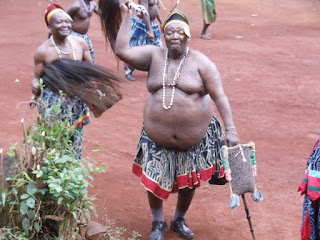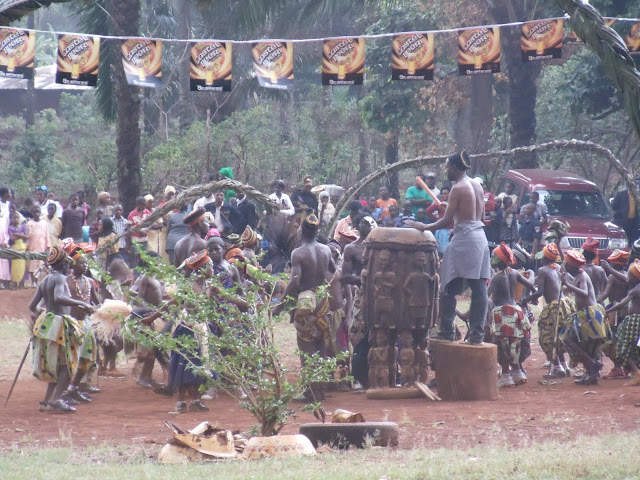BABUNGO
Babungo is a community about 2 hours from Bamenda, complete with Fon (chief), palace and marvelous traditional festivals.
It also has a unique mental health facility combining traditional and western medecines.
The traditional healer who founded this center has since passed on, but it is now being run by two of his children.
It is an inpatient facility housing psychiatric patients and their care-givers.
Each person has their own room with two beds and receives both Western psychiatric medications and herbal medecines developed over centuries by the traditional healers.
They also receive occupational therapies, exercise regimens and opportunities for socialization.
They are fortunate to have won the heart and soul of a VSO volunteer who has been coming there intermittently for the past 7 years providing her psychiatric nursing skills and also has done fund-raising to build the infrastructure of the facility.
It is set in a beautiful rural area with ample space, so the inpatients are allowed the freedom to walk around the grounds, take in the fresh air, and benefit from the peaceful environment. Because it is such a unique and positive example of the blend of traditional and western, one of the two psychiatrists in
Cameroon has also taken this facility under his tutelage and comes there on a monthly basis to consult with the staff.
I was very encouraged to see that such a humane and healing environment can exist for the mentally ill in
Cameroon.
The March Babungo festival was for the celebration of the return of one of the palace statues that had been away from its home for some time. It was a gorgeous occasion, complete with drummers, dancers (young and old), snake charmers, and dignitaries. The health center even took the opportunity to do a little advertising of themselves. (See Photos.)
WITCHCRAFT
Having had the opportunity to spend more time in the culture, the stories and beliefs in witchcraft begin to be revealed. It seems to be deeply embedded in all layers of the culture regardless of education, religious beliefs, or profession. It is even included in the laws which say that a person CAN be charged with witchcraft – the main problem being the proving of it. It covers many ills to include illness, infertility, poor harvest, poor school performance, nightmares and insanity. There is a story of some family members joining together to kill their father as they believed he was casting spells and killing off some of the family members. Jealousy and greed are said to be motivators behind many harmful and deadly actions on family and neighbors. The inheritance laws, unfortunately, contribute to some of these sad stories. Most often the women have no right to inherit the husband’s property, so there are numerous stories of elder brothers trying to kill-off their brothers so they can inherit their brother’s land. One friend told me that his father died of poisoning and he believes it was done by one of his uncles. Naturally he is literally scared to death even though his family has been left with nothing. Different villages have different inheritance laws. One unique village tradition leaves the properties to the oldest son of the surviving sister (the deceased’s nephew). One young father from that village told me that he didn’t want to live there as he didn’t want his worldly goods going to a nephew, but to his newly born son.
In the Northwest Region where I am living, property lines continue to be a big source of conflict. Most of the intertribal conflict between villages is about land-grabbing with neighbors from another tribe coming into the neighboring property, burning the crops, stealing the livestock, destroying the homes, and sometimes injuring or killing the residents. Because these property lines have never been officially delineated or agreed upon, it can become a hot-spot of contention resulting in death and destruction. There are councils and legal channels to try to mediate these problems, but sometimes the people simply take action into their own hands.
BAMENDA CATTLE MARKET

On the lighter side, every Thursday in the hills above Bamenda the cow market is held. Herders from villages as far as a 2 day walk come with their cattle in the hopes of both buying and selling. There are hundreds of cows, and dozens of buyers, sellers and middlemen all using their sharp eyes to find the right cows - usually for meat or breeding.
For those with a vegetarian palate, the fresh fruits are in abundance and marvelous. Everyday I enter a world filled with mangoes, avocadoes, pineapples, watermelon, papaya, and oranges. The only thing not grown here, I am told, are the apples which are expensive. My night guard has transformed my backyard into a garden, growing tomatoes, peppers, beans, carrots, corn, basil, parsley…and other things I am not sure about. The rains are here, the countryside is a carpet of deep green, and it is beautiful.
